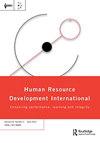集体成就、凝聚力支持、互补专业知识:3C共享领导力的新兴模式
IF 3.8
Q2 MANAGEMENT
引用次数: 0
摘要
摘要社会要求采用一种共同的领导方法来应对多样化、复杂和动态的情况。然而,现有的关于共享领导力的研究缺乏明确的理论分析和/或足够的实证证据。为了填补这一研究空白,本文首先澄清了关于共享领导力的概念模糊性。其次,受社会交换理论(SET)和团队合作涌现理论的启发,提出了一个新的模型3Cs,通过集体成就领导力、凝聚力支持领导力和互补专业知识领导力三个维度来表征共享领导力。该模型解释了宏观层面的共同领导现象是如何通过微观个体行为产生的,无论是在组成形式(即团队成员执行同质领导行为)还是在汇编形式(即小组成员执行异质领导行为)中,都与当前对共享领导的理解相兼容,但比其更具体、更全面。采用混合方法,对领导力课程中的12名国际研究生进行了定性研究,并对来自中国企业的86名领导者和370名团队成员进行了定量研究,以验证所提出模型的有效性。该模式为人力资源开发(HRD)专业人员提供了一种关于如何培养共同领导力的全面实用的方法。本文章由计算机程序翻译,如有差异,请以英文原文为准。
Collective achievement, cohesive support, complementary expertise: 3Cs emergent model for shared leadership
ABSTRACT Society is asking for a shared leadership approach to deal with diverse, complex, and dynamic situations. Existing studies on shared leadership, however, lack clear theoretical analysis and/or sufficient empirical evidence. To fill this research gap, this article first clarifies conceptual ambiguities regarding shared leadership. Second, inspired by social exchange theory (SET) and emergence theory on team cooperation, it proposes a novel model, 3Cs, to characterize shared leadership through three dimensions: collective achievement leadership, cohesive support leadership, and complementary expertise leadership. This model explains how macro-level shared leadership phenomenon emerges through micro individual behaviours, and is compatible with but more concrete and comprehensive than the current understanding of shared leadership in either a composition form (i.e., team members perform homogeneous leadership behaviours) or a compilation form (i.e., team members perform heterogeneous leadership behaviours). A mixed-methods approach combining a qualitative study on 12 international graduate students in a leadership programme and a quantitative study on 86 leaders and 370 team members from Chinese enterprises was conducted to confirm the validity of the proposed model. This model provides human resource development (HRD) professionals with a comprehensively practical approach regarding how to develop shared leadership.
求助全文
通过发布文献求助,成功后即可免费获取论文全文。
去求助
来源期刊

HUMAN RESOURCE DEVELOPMENT INTERNATIONAL
MANAGEMENT-
CiteScore
11.40
自引率
11.10%
发文量
43
期刊介绍:
Human Resource Development International promotes all aspects of practice and research that explore issues of individual, group and organisational learning and performance. In adopting this perspective Human Resource Development International is committed to questioning the divide between practice and theory; between the practitioner and the academic; and between traditional and experimental methodological approaches. Human Resource Development International is committed to a wide understanding of ''organisation'' - one that extends through self-managed teams, voluntary work, or family businesses to global enterprises and bureaucracies. Human Resource Development International also commits itself to exploring the development of organisations and the life-long learning of people and their collectivity (organisation), their strategy and their policy, from all parts of the world. In this way Human Resource Development International will become a leading forum for debate and exploration of the interdisciplinary field of human resource development.
 求助内容:
求助内容: 应助结果提醒方式:
应助结果提醒方式:


